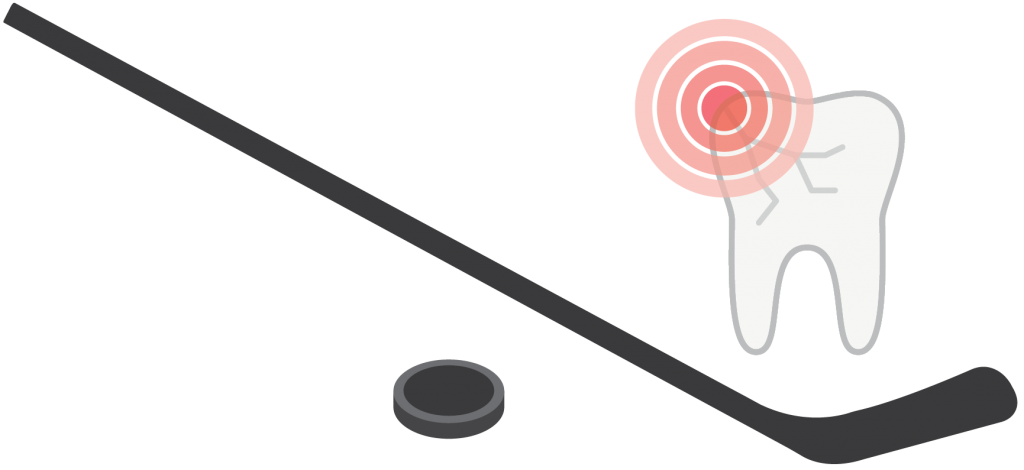
Five steps to fixing your grin
What do hockey pucks and hard candy have in common? They’re both culprits when it comes to chipping teeth. If you lose a chunk of an incisor, don’t feel bad. Dentists see chipped teeth all the time—especially during hockey season!—and they can often fix you up quickly.
1. GET SCHEDULED
First, schedule an appointment with your dentist as soon as possible. The sooner you get in, the more likely it is you’ll prevent your chipped tooth from getting infected and decaying further.
2. TREAT THE PAIN
While you wait to see your dentist, ease the pain you’re probably experiencing. We recommend an over-the-counter medication like ibuprofen to soothe aches and keep swelling at bay.
If medicine isn’t doing the trick, it’s possible you’ve damaged a nerve. In this case, wrap an ice pack in a clean towel and apply to the sore area of your mouth a few times per day.
3. KEEP IT CLEAN
A chipped tooth can be raw, exposed and vulnerable, so keep it clean and food-free to prevent infection. Brushing your teeth twice each day still applies, but if that hurts too much, avoid the area or opt for mouthwash until you can get to your dentist.
4. VISIT THE DENTIST
Let’s look at the options dentists typically present for this common problem:
Bonding is an easy fix for uncomplicated, primarily cosmetic chips. Your dentist will create a natural-looking extension and mold it over your chipped tooth. Bonding lasts up to 10 years.
Veneers: These porcelain covers are for chips that go beyond cosmetic damage. They look natural and last up to 20 years. They tend to be the more expensive option, but could be the best solution if you’ve cracked a bonding several times. Crowns: This option is longer-lasting—up to 30 years—and shields your entire damaged tooth with porcelain. A crown is most appropriate when a large portion of the original tooth is lost.
Dental implants are typically used for cracks just below the gum line. Your dentist will remove the tooth, allow the space to heal, and add a metal post to your gum line, then insert an implant that looks and feels just like an actual tooth. This process takes a while, but you’ll avoid infection and a root canal. If well taken care of, a dental implant could last a lifetime!
5. BRUSH. FLOSS. WIN.
Good dental hygiene is your best defense against another chip. Take good care of your teeth by brushing with fluoride at least twice daily, two minutes at a time, and floss your teeth daily to excavate food that’s moved in without your permission. The stronger your teeth are, the less likely they’ll chip.
A calcium-rich diet strengthens your chompers, too. Drinking milk, eating leafy-green veggies and snacking on walnuts keeps your teeth robust and where they’re supposed to be: safe inside your mouth.
Lastly—and you might have just learned this the hard way—refrain from using your teeth as a tool. You get one set for life, so skip using them to open that stuck nail polish top or soda bottle cap. And avoid flying hockey pucks!





